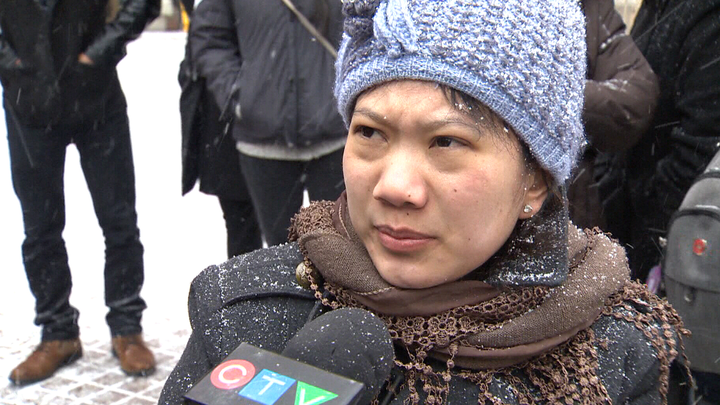Where Empathy and Compassion Are Called For
"I can still use my arm, I can still use a computer and I can still talk. I'm thinking, if they give me a chance to stay I can still work, or I can still study."
"But still right now I’m able to move around on my own, and I’m starting to be more independent."
"Even though I’m in a wheelchair, I’m still hoping and trying to still help my family."
"We're still hoping they can allow me to stay here. I was so blessed and thankful for all my friends and church friends who came here to support me."
Maria Victoria Venancio, 29, Filipina, temporary foreign worker, Alberta
"She’s told me recently she’s been able to stand on her own, which from when we dealt with her car accident a few years ago was almost unimaginable.""She is working with her doctors and the University of Alberta here and actually making some tremendous progress in her mobility."
"[In the Philippines] her family lives 3 hours from a major center and the simple lack of infrastructure would present incredible challenges to her. She's becoming more independent. And here in Canada, where we have things we take for granted, like paved streets and DATS buses, she has the opportunity to progress and live a relatively fulfilling life."
Chris Bataluk, pro bono lawyer for Ms. Venancio
This young woman came to Canada under the country's Temporary Foreign Workers program, as many young women do from the Philippines, hoping to find employment and to earn their way eventually into recognition as potential future citizens by achieving permanent resident status. Many young Filipinas come to Canada to work as domestic aids, as minders of other people's children, leaving their own young children behind in the Philippines, hoping to be reunited with them once they've been able to settle in Canada, and to sponsor family members for emigration to Canada where they feel they will find a better life with greater opportunities to advance themselves economically.
The federal Temporary Foreign Workers program was established as a way to fill employment needs in areas where employers claim Canadians have no interest in working at those jobs. Many of those jobs fall into a professional category where there may be a shortage of such skills within the country, but many more fall into the more pedestrian category of poorly-paid unskilled labour in the service industry. At a time in Alberta when, as a result of the oil boom, many such jobs went unfilled, Maria Victoria Venancio applied to the program, to work for an Edmonton-area McDonald's outlet.
She was doing very well in her area of employment, so much so that it appeared that she was on track to a supervisory position. One day in 2011, en route to work by her usual method of bicycling, she was struck by a vehicle on her commuting route. This was no brief clip that knocked her off her bicycle and little harm done. The accident was serious enough to render the young woman a quadriplegic. And she now finds herself in a double bind. Not only has her mobility been utterly impaired and with it her prospects for future employment, but as a visitor to Canada so to speak, she does not qualify for universal health care. And since she no longer works, she is facing deportation.
Appealing to a Citizenship and Immigration hearing gave her no reprieve on the compassionate and humanitarian grounds she might have hoped for. The hearing ruled that she had no legal status in Canada. But there yet remains hope that her lawyer is determined to explore, that the Canada Border Services Agency, next in line to hear her case, will schedule a hearing to decide whether an order to send her back to the Philippines will be enforced. In her native country she would have limited access to health care.
Wheelchair-bound, her life would be even more difficult than it is in Canada, since in the Philippines, an impoverished country that cannot afford to pave all its roads and sidewalks, or to ensure that public help for the handicapped is recognized in accessible ramps and elevators, her ability to function in the public sphere would be minimal. The young woman has friends and supporters in Edmonton. She had won a modest settlement in compensation for the accident which cost her the use of her limbs. She has made application to be granted permanent residency in Canada.
She had spent three weeks in hospital at the time of the accident. The compensation she received resulting from the accident was relatively small, her lawyer pointed out, since the adjudicators found her to be partially at fault for the accident's occurrence. "She would be leaving what is essentially one of the better situations someone like her could be in and going to a very, very dismal situation", pointed out Mr. Bataluk. At the present time, she has been receiving assistance from doctors at the University of Alberta who have themselves been absorbing the cost.
The rehabilitation she has undertone has been extensive, enabling her to regain partial use of an arm, not quite enough to have her write, but sufficient to give her some degree of independence. She is also able to stand briefly. Doctors have advised her that she will always be wheelchair-dependent. But she remains optimistic about her future and that in and of itself is a tremendous boost toward the possibility of further rehabilitation, however slight.
Labels: Canada, Employment, Human Relations, Philippines, Vehicle Accident


0 Comments:
Post a Comment
<< Home